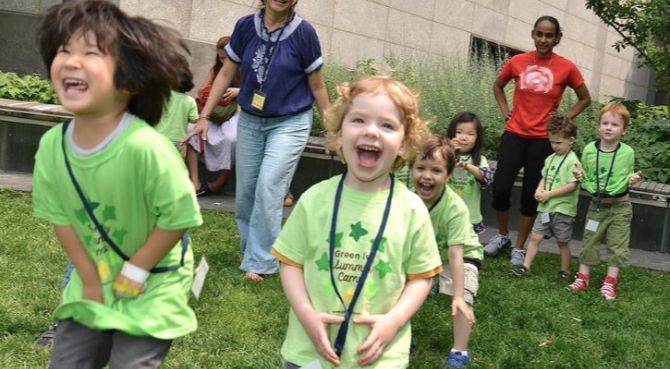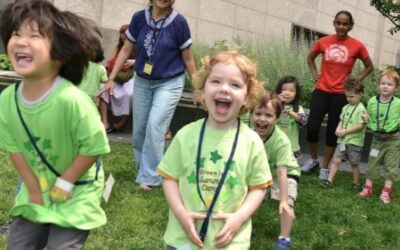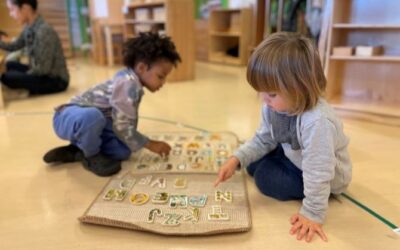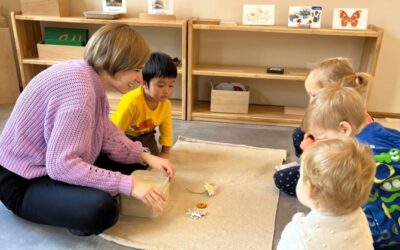Battery Park Montessori
About | What is Montessori | Benefit of Montessori | Contact
Education Team 20 NOVEMBER 2023
Battery Park Montessori is New York City’s pioneer in bringing trilingual language exposure with the authentic Montessori method. Here, children are immersed in the Spanish, Mandarin, and English languages through the nurturing guidance of Montessori-trained teachers. The curriculum is carefully tailored to meet each child’s social, emotional, cognitive, academic, and physical needs, promoting a holistic developmental approach.

How an Authentic Montessori Approach and Trilingual Learning Come Together
The significance of Montessori education is underscored by its emphasis on fostering independence and natural curiosity. At Battery Park Montessori, children are the architects of their own learning journey, building problem-solving abilities and critical thinking skills in an environment that honors their innate intelligence and capacity for discovery. As they progress from Nursery Ones through to Kindergarten, the goal is to instill a deep-seated love of learning and self-discovery.
As students transition from Battery Park Montessori to elementary school, they carry forward the benefits of their early Montessori education that sets them on a path for success in their continuing education and all future endeavors. To fully appreciate the advantages this style of learning offers, one must delve into its origins and philosophy.
What is Montessori?
The Montessori Method of education is a time-tested, child-centered educational approach developed by Dr. Maria Montessori. It is based on scientific observations of children from birth to adulthood.
Through the guidance of a credentialed Montessori teacher and a classroom filled with self-correcting and sequenced didactic materials, children are encouraged to grow in their independence, curiosity, and problem solving. Montessori is one of the world’s most successful early childhood models and supports every aspect of a child’s development: physical, social, emotional, and cognitive.
Who was Dr. Maria Montessori?
Dr. Montessori was born in 1870 in Chiaravalle, Italy and became the first female physician in her country. Her clinical observations as both a medical doctor and scientific researcher led her to analyze how children learn and build meaning from what they find in their environment. Through her careful observations she noticed that children had an effortless ability to absorb knowledge from their surroundings, as well as a tireless interest in manipulating materials. Every piece of equipment and every exercise Dr. Maria Montessori went on to develop were based on what she observed children do ‘naturally’ and without much assistance from teachers.
In 1907, Dr. Maria Montessori opened her first school, Casa dei Bambini, which offered the materials and methods she designed. Those same self-correcting materials that she created and used back then – materials that encouraged the use of children’s five senses so that they could become observers of their own community and environment while developing their own capabilities and motivation – are still used today in schools world-wide. Her philosophy of child development and her rationale for guiding such growth have withstood the test of time and have been supported since by current brain and child development research.


Six Key Components to Montessori
Students-centered: In a Montessori school the teacher is the “guide on the side.” The materials and flow of the classroom promote intrigue and curiosity, drawing children in and enticing them to learn more. Teachers observe children’s interests and use of the materials to then adapt the children’s learning experiences by finding ways to enhance their understanding of a specific concept or by introducing them to other materials in the classroom. Montessori schools believe that development varies in each individual, and therefore each child must be allowed to progress at his or her own pace. Individuality is both respected and nurtured.
Classrooms are multi-age: Classrooms are intended to be like families where the younger children learn from the older children and the older children reinforce their own learning and skills by teaching concepts they have mastered to the younger children.
Teachers are Montessori credentialed: The role of the Montessori teacher is to develop the potential in every child. Montessori teachers are not only trained in how to prepare a classroom and present the materials, but also are trained in childhood development and how to “scientifically” observe a child. It is through these observations that teachers adapt the children’s learning experience so that they reach their full capabilities.
Classrooms are called “Prepared” environments: The classrooms are prepared by the teachers in a way that promotes children’s independence and free movement within a structured environment. All furniture is age-appropriate and all materials are easily accessible to the children. The classroom is orderly, aesthetically pleasing, and lends itself to both independent and collaborative work.
Use of Montessori materials: Montessori materials in the toddler and primary (preschool) classrooms are concrete materials that introduce simple concepts at first, but then grow in complexity towards abstraction. The meticulously placed and maintained materials are intended to spur interest and invite the children to explore. Materials are self-correcting as a way for children to recognize their own progress and support their own learning independent of the teacher.
Work cycles are long, uninterrupted spurts of work activity: During the work cycle, children work individually or with others in small groups on activities initiated by the children. Teachers present lessons to and interact with children either individually or in small groups as well. These long spurts of steady work allow for children to have time to complete works at their own pace while building coordination and concentration.
Music and Movement
In addition to these six key components, music is an integral part of Battery Park Montessori’s daily curriculum. In the classroom, we introduce the children to an array of songs and nursery rhymes in our program’s languages – Mandarin, Spanish, and English. We rely heavily on songs for transitions, to help children self-regulate, and to teach vocabulary.
Movement is a fundamental principle of Montessori education. We invest ample time each school day to support each child’s development and use large and fine motor skills, and to move gracefully inside and outside of the classroom. Through freedom of movement, the child learns to respect other people and to self-monitor how his or her own actions impact others.
Children also engage in outdoor play throughout the day. For Battery Park Montessori, our urban patio is an extension of the classroom and allows children another opportunity to refine their gross and fine motor skills while working on collaboration and respect for others.

Montessori-inspired Computer Science Learning
Battery Park Montessori partners with MIT Media Lab’s Learning Beautiful to bring their groundbreaking Montessori-based learning materials to our students. Learning Beautiful founder, Kim Smith, works closely with our educators to maximize the use of the materials in our classrooms.Learning Beautiful provides a set of Montessori materials designed to teach the basics of computer science and support an understanding of coding, logic and computation without ever touching a computer. The materials are consistent with the high aesthetic standard of Montessori, as well as the principles of learning design that support independent use by young children.
Benefits of a Montessori Education
A number of studies have pointed to the benefits of a Montessori education – specifically how the use of concrete materials supports brain development and how the use of one’s senses to extract meaning promotes a deeper understanding of concepts. Much research points to how Montessori supports the development of executive functions skills such as order, concentration and coordination through the use of materials that allow for repetition and for working at one’s own pace.Beyond inherently supporting strong cognitive skills, a Montessori education provides children with strong social and emotional support as well. Through the peace curriculum and the classrooms’ grace and courtesy protocols, children learn to resolve conflicts on their own and respect each person and the environment. Many students walk away with social and emotional skills, such as empathy and self-regulation that last a lifetime.
Montessori for the Future
Montessori’s approach to education nurtures a child’s innate curiosity – the same curiosity needed to develop the ingenuity and critical thinking skills needed for our future. From the moment a child enters our Battery Park Montessori school, they are invited to ask questions, pursue their interests and think outside the box by completing meaningful and challenging work – work that requires persistent problem solving. This form of self-direction teaches children to overcome challenges, implement creative solutions and think limitlessly. As the world becomes more entrepreneurial and moves towards unknown technological terrain, our children need those very skills to not only overcome obstacles with resilience and focus, but to be the fearless and revolutionary leaders and thinkers of tomorrow.Battery Park Montessori invites you to come and see how our children thrive in a space prepared and guided by teachers, and see firsthand how our approach encourages children to take their innate curiosity and develop the building blocks needed for a future where resourcefulness, initiative, global-awareness, and collaboration will be paramount.
Battery Park Montessori
https://www.batteryparkmontessori.com/
Address: 21 S End Ave. New York NY 10280
Phone: +1 347-237-7606
Email: admissions@greenivy.com





